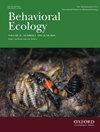没有证据表明穴巢育雏寄生虫宿主对寄生的适应性耐受性
IF 2.5
3区 环境科学与生态学
Q2 BEHAVIORAL SCIENCES
引用次数: 0
摘要
寄主接受鸟类的育雏寄生是育雏寄生-寄主共同进化中最令人费解的问题之一。棕头牛鸝(Molothrus ater)的宿主接受寄生的最常见解释是进化滞后,这表明宿主还没有足够的时间进化出防御寄生的能力。另外,当拒绝寄生的成本超过收益时,接受寄生可能是最佳策略。缺乏巢穴假说适用于不能自己挖掘巢穴的次生穴居鸟类,并预测当没有空闲的巢穴可重新筑巢时,宿主会接受寄生,而不是抛弃被寄生的巢穴。我使用褐喉莺(Pronotaria citrea)测试了这一假设,褐喉莺是一种常见的被寄生的穴巢牛鸝宿主。我使用了一个成对的巢箱设计,并预测如果宿主因为缺乏替代巢址而接受寄生,它们就会抛弃被寄生的巢,并在其领地上的空巢箱中重新筑巢。我记录了37个巢被寄生的案例,莺只抛弃了2个被寄生的巢箱,而选择了一个空置的巢箱。这两次弃巢都是寄生虫以外的因素造成的,弃巢率与只有一个巢箱的对照组没有差别。此外,尽管莺的领地上有空置的巢箱,但有七只莺还是在已经有牛鸟蛋的巢箱中开始了产卵。这些结果表明,莺接受寄生并非因为耐受性,而很可能是由于进化滞后。本文章由计算机程序翻译,如有差异,请以英文原文为准。
No evidence of adaptive tolerance of parasitism in a cavity-nesting brood parasite host
Acceptance of avian brood parasitism by hosts is one of the most enigmatic aspects of brood parasite-host coevolution. The most common explanation for acceptance of parasitism by hosts of the brown-headed cowbird (Molothrus ater) is evolutionary lag, which suggests that hosts have not had enough time to evolve defenses against parasitism. Alternatively, acceptance may be the optimal strategy when the costs of rejecting parasitism exceed the benefits. The lack of nest site hypothesis applies to secondary cavity-nesting birds that cannot excavate their own nests and predicts that hosts accept parasitism instead of deserting a parasitized nest when there are no vacant nest sites available in which to renest. I tested this hypothesis using the prothonotary warbler (Pronotaria citrea), a commonly parasitized, cavity-nesting cowbird host. I used a paired nest box design and predicted that if hosts accept parasitism because of a lack of alternative nest sites, they should desert parasitized nests and renest in the vacant nest box on their territory. I recorded 37 cases where a nest was parasitized and warblers only deserted 2 parasitized nest boxes for a vacant nest box. Both desertions were attributable to factors other than parasitism and the rate of desertion did not differ from controls that only had a single nest box. Moreover, seven of the warblers initiated clutches in nest boxes that already contained cowbird egg despite having vacant nest boxes available on their territories. These results indicate that warblers do not accept parasitism because of tolerance, but likely due to evolutionary lag.
求助全文
通过发布文献求助,成功后即可免费获取论文全文。
去求助
来源期刊

Behavioral Ecology
环境科学-动物学
CiteScore
5.20
自引率
8.30%
发文量
93
审稿时长
3.0 months
期刊介绍:
Studies on the whole range of behaving organisms, including plants, invertebrates, vertebrates, and humans, are included.
Behavioral Ecology construes the field in its broadest sense to include 1) the use of ecological and evolutionary processes to explain the occurrence and adaptive significance of behavior patterns; 2) the use of behavioral processes to predict ecological patterns, and 3) empirical, comparative analyses relating behavior to the environment in which it occurs.
 求助内容:
求助内容: 应助结果提醒方式:
应助结果提醒方式:


